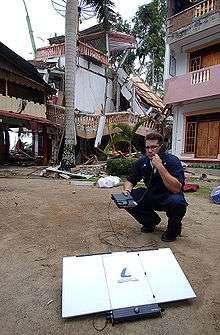Phone service
Telephones are a crucial part of modern living while at home. While many prefer to leave them (and the endless calls from the office) behind while travelling, others — from business travellers to motorists — find they can be an excellent tool for keeping in touch, planning or obtaining roadside assistance.
Call
|
'Check charges in advance' There are many horror stories of travellers being presented with unexpected outrageously large bills — anywhere from a few hundred dollars up to tens of thousands — either by hotels with very high charges for calls from the room or by cell phone companies with painful rates for "roaming", making or receiving calls outside the home area. Even reputable hotels are no exception here. Often these bills can be negotiated down somewhat after the fact, but rarely enough to make them painless. The best defence is to find out in advance what calls will cost so that you can avoid using overpriced services. |
In-room phones
Many hotels and motels charge set rates for all calls made from in-room telephones which are much higher than residential or business phones. Some even charge for calls to toll-free numbers. A few have been known to block calls to telco services like Bell Canada's "Canada Direct" or (more rarely) fraudulently redirect them to another provider who immediately asks for a credit card number. Check the call rates before making a call; upscale and sometimes even budget hotels may charge US$35/min or more for international calls.
As most hotels now provide some form of broadband Internet, it may be cheaper to run a voice-over-IP application on a portable device instead of using the telephone in the room. Budget hotels usually include wi-fi in their base price, while many high-end properties charge substantial extra hidden fees.
Hotels which refuse to rent a room without a charge card most often bill a vast assortment of extra charges directly to the card. Euphemistically called "incidentals" by innkeepers, these can range from overpriced minibars and pay-per-view TV channels to local telephone calls at double or more the cost of a call from a coin-operated pay phone.
A rare few business hotels offer packages that include complimentary unlimited local and toll-free calls.
If in doubt, be sure to enquire before checking in.
Mobile phones
- Main article: Mobile phones
You may be able to bring your mobile phone and use it either with billing through your home carrier ("roaming") or by obtaining a SIM card from a local provider. Another option is to buy an inexpensive low-end prepaid handset at destination.
If you have a smartphone, there are lots of travel-oriented apps to make your trip easier.
Pay phones
.jpg)
While still around, pay phones are diminishing in number and most are able to place outbound calls only. Trunk or toll calls tend to be expensive, with high initial minimums. Some cost saving may be possible using prepaid calling cards (which are necessary for some of the phones).
Coin-paid long distance calls were traditionally operator-assisted, so they carry the worst rates. A call which only reaches voicemail will still incur the full toll, even though there's no means for the other party to return the call.
Check the information in the booth before making a call, especially with payphone booths not branded by a major carrier. While sometimes an obscure third-party provider is cheaper, often specialist providers charge higher fees or a substantial minimum. These can be a rude surprise if you pay by credit card.
Often, courtesy phones at airports and similar places will ringdown a specific taxi or similar traveller services. Look out for these so you may not need to use a pay phone.
Pre-paid phone cards
Every corner store is filled with a confusing array of pre-paid phone cards that can be used from pay phones or ordinary telephones. While most cards are good for calling anywhere, some specialise in providing favourable call rates to specific groups of countries.
Access to these services is often through a toll-free telephone number that can be called from most phones without charge. (Be aware that some pay phones and hotel phones charge for toll-free calls; a freephone number may also still incur airtime charges on a mobile telephone.) The call is then redirected to a cheaper, competitive long distance provider or a voice-over-Internet server.
While these cards often feature excellent international rates, read the fine print carefully. This contains information on when the best rates apply. Many cards carry hidden charges (such as a substantially higher rate for the first minute of a long-distance call - which is incurred even if only an answering machine responds - or a per-month charge even if the card is not being used). These are a trap for the unwary as this can wipe out the value of a card rapidly, especially if you are mostly making short calls or leaving the card idle with minutes remaining on the balance. Calls initiated via toll-free numbers from U.S. pay phones may carry a higher rate or a surcharge, as the owner of the toll-free number must pay sixty cents per payphone call on top of any long distance charge.
PINless phone cards are offered by several vendors: register one phone number (for example your cell phone number) and add funds when balance is low.
Telco calling cards
Some telephone service providers offer a calling card, often attached to your existing telephone account, which can be requested before travelling.
These allow trunk calls while on the road, by giving the calling card number to an operator. You may also be provided with a number to connect to your home provider to place calls home from overseas, allowing you to speak to an operator in your home language.
These services are usually charged with a surcharge on top of the provider's usual rates. Depending on the telecommunication company, you may be able to get a calling card linked to just a credit card without having to have telephone service with them. Various third-party services may be reached by dialling an access number and then following instructions from there.
VoIP
- Main article: Internet telephony
Where you have full access to the Internet at a reasonable speed, making phone calls over the Internet is the cheapest option. Free calls are usually possible if you have compatible calling software or apps installed on your respective devices, and are online at the same time.

If your smartphone has Wi-Fi, making cheap phone calls may be as easy as installing a free app (either a generic SIP client, or a programme for one specific provider like Skype or Viber) and visiting a Wi-Fi hotspot. Similar "softphone" software run on laptops or tablets using the built-in microphone and loudspeakers. Nonetheless a headset with a boom microphone gives better audio.
The quality of Internet telephone connections varies widely, based on the underlying network connection. Some publicly available networks can block VoIP, some have very high latency, many are simply too slow, and in some countries Internet telephony can be blocked entirely to protect the revenues of national phone companies. Etisalat, the state-owned telecommunications provider of the United Arab Emirates, has been blocking access to Skype entirely; some hotels in the UAE may provide access through 'TheWayOut' Wi-Fi service.
You should install a VoIP app and select a voice service provider (VSP) to test your configuration before departing.
It may be possible to rent a computer with Skype from a local Internet store.
In-flight telephones
Some flights offer phone service via an in-seat phone. These typically cost around US$5/minute for a voice call, or US$2 per SMS.
Receive
In-room phones
Hotels and motels usually do not charge for voice calls you receive. Check for any received telephone charges before giving out a hotel or motel telephone number for people to call you.
Usually there are charges for received faxes.
Voice mail
If you are going to be out of range of a telephone, but still want to receive calls, voice mail may be an option. Most telephone service providers offer a voice mail option, usually as an add-on to an existing land line, pager, mobile or Internet-based telephone number. Some offer it as a stand-alone service.
You can usually check your voice mail remotely; obtain the access number and login details from your voice mail provider before leaving home.
Voice over IP
If you have access to broadband Internet during your travels, voice-over-Internet allows you to bring a telephone number from your home country with you wherever you go, typically for a penny or two a minute. Applications for the standard session initiation protocol (SIP) are available both for laptop PC's and small mobile devices like Google's Android system. Unlike a cellular phone (which incurs substantial "roaming" charges when taken out of its home region), calls to your device will be directed over the Internet, the cost of which in the broadband case seldom depends on the amount of traffic. But if your connection is via the mobile phone network or a satellite connection, the per megabyte cost may be heavy.
Mobile
Depending on the length of your trip, it may make sense to buy a local pre-paid mobile telephone at destination or a local SIM card for use in your existing mobile device. Roaming with your existing phone may be manageable when visiting one European Union country from another, but further abroad the cost may be prohibitive or the service not available. Many prepaid handsets will not roam at all. In most of Europe a pre-paid SIM card is usually very cheap (€10 or less with some credit included). In some countries (e.g. Italy) users may need to present identification and/or a local tax code.
There are multiple, incompatible systems (GSM, CDMA, UMTS) and the frequencies used also vary from one continent to another. Some handsets are locked to one provider, requiring an unlock code before they can be used with a local SIM card. They can also be simply incompatible with the network/s at a destination.
See Mobile telephones for more information on cellular mobile and satellite telephony.
Satellite phones

In remote locations, without cell phone coverage, a satellite phone may be your only option. One must be outdoors with clear line of sight to the satellite to make a phone call. The service is used by shipping, including pleasure craft, as well as expeditions to remote locations with no mobile infrastructure and disaster relief missions to locations where the domestic network is damaged or destroyed.
As the most expensive option, satellite telephony is used where no other service is available.
Satellite phones may be not available for purchase or illegal in Saudi Arabia, China, India, Myanmar (formerly Burma), Cuba, Iran, Libya,North Korea, North Sri Lanka, and Syria. They will, however, function in these areas. Some countries require a special permit for using satellite phones within their territory.